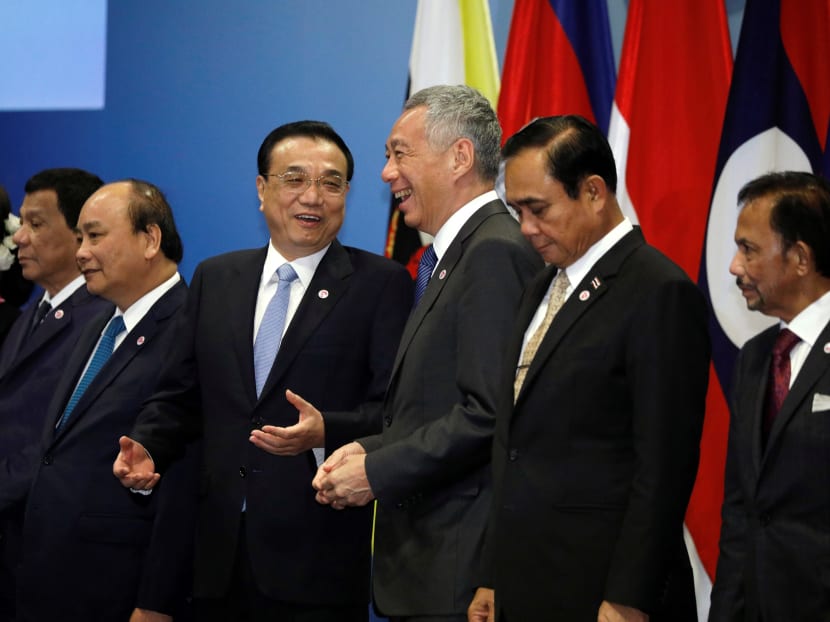PM Lee urges Asean, China to build on ‘positive momentum’ in ties
SINGAPORE — To build on the “positive momentum” in relations, China and the Association of South-east Asian Nations (Asean) should press ahead with efforts to ride the opportunities of the Fourth Industrial Revolution, and stay committed to multilateral trade and economic co-operation, Prime Minister Lee Hsien Loong said.

China's Premier Li Keqiang poses for a photo with leaders from the Association of South-east Asian Nations (Asean) at the Asean-China Summit in Singapore.
SINGAPORE — To build on the “positive momentum” in relations, China and the Association of South-east Asian Nations (Asean) should press ahead with efforts to ride the opportunities of the Fourth Industrial Revolution, and stay committed to multilateral trade and economic co-operation, Prime Minister Lee Hsien Loong said.
Speaking on Wednesday (Nov 14) at the 21st Asean-China Summit at the Suntec Singapore Convention Centre, Mr Lee said the 10-member regional grouping and China should continue to find new areas of collaboration, take advantage of fresh opportunities presented by Industry 4.0, and work together to bring their “peoples and economies closer”.
The Fourth Industrial Revolution is characterised by a fusion of technologies blurring the lines between the physical, digital and biological spheres. These include artificial intelligence, robotics, drones and autonomous vehicles.
At the summit, regional leaders adopted a joint Asean-China statement on science, technology and innovation co-operation. TODAY has contacted Singapore’s Foreign Affairs Ministry for more information.
Calling this a “positive step”, Mr Lee also welcomed China’s proposals to deepen co-operation with the Asean Smart Cities Network, a platform to facilitate tie-ups in the development of smart cities. Twenty-six pilot cities, including Yangon in Myanmar and Luang Prabang in Laos, are on board.
Besides leveraging new opportunities, a continued commitment to multilateral trade and economic co-operation was also key, Mr Lee said.
Asean and China have benefited immensely from a free, open and rules-based multilateral trading system. “To sustain this economic dynamism, our economies will need to stay open and connected to one another,” he said.
These can be done via a range of avenues, including mobilising private capital and tapping international financial institutions, such as the Asian Infrastructure Investment Bank and the Asian Development Bank, to close the gap in infrastructure financing in Asean.
Asean and China should also put in place fully a protocol to upgrade the Asean-China Free-Trade Area, and advance the protocol's future work programme, Mr Lee reiterated.
The free-trade area, established in 2010 and upgraded in 2015, is among the world’s biggest. The enhanced free-trade area will improve access to services and investment, cut business costs, reduce administrative requirements, and build capabilities in new growth sectors.
TIES HAVE GROWN ‘FROM STRENGTH TO STRENGTH’
Since Asean and China entered a strategic partnership 15 years ago, Mr Lee said economic ties have grown from strength to strength, and the relationship is “strong, substantial and mutually beneficial”.
China has been Asean’s top trading partner for eight years in a row. Last year, the regional grouping’s merchandise trade with China reached US$442 billion (S$610 billion), making up 17 per cent of Asean’s total merchandise trade.
While China and Asean are bound by wide-ranging and emerging interests, Chinese Premier Li Keqiang acknowledged in his opening remarks at the summit that there were some differences, and the two sides “have never shied away” from them.
For instance, Mr Li said efforts to work through their differences in the South China Sea have allowed for peace and stability to be maintained, and the situation is “moving towards greater stability”.
The strategic waterway has been a longstanding flashpoint in the region owing to competing territorial claims by China and several South-east Asian nations.
Earlier this year, China and Asean agreed on a single text as the basis for negotiations on a code of conduct in the waterway.
China stands ready to work with Asean to conclude consultations on the code of conduct in three years, Mr Li reiterated.
Agreeing, Mr Lee cited the need for continued dialogue and practical co-operation to enhance peace and stability in the region, as well as deepen mutual trust and confidence.
As negotiations on the code of conduct continue, he urged all parties to maintain restraint, and keep the environment stable and conductive for talks to proceed smoothly.
Singapore served as the coordinator for Asean-China dialogue relations from 2015 until August this year, before the Philippines took over the role.











